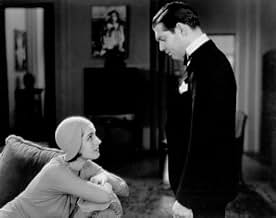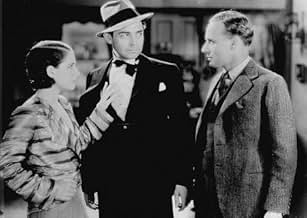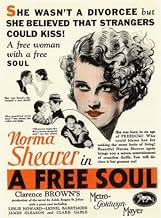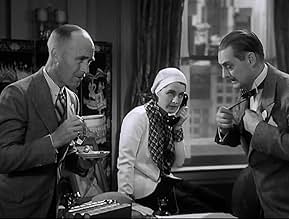IMDb-BEWERTUNG
6,6/10
3131
IHRE BEWERTUNG
Ein alkoholkranker Anwalt, der einen berüchtigten Spieler wegen Mordes erfolgreich verteidigt hat, protestiert, als seine freigeistige Tochter eine Liebesbeziehung mit ihm eingeht.Ein alkoholkranker Anwalt, der einen berüchtigten Spieler wegen Mordes erfolgreich verteidigt hat, protestiert, als seine freigeistige Tochter eine Liebesbeziehung mit ihm eingeht.Ein alkoholkranker Anwalt, der einen berüchtigten Spieler wegen Mordes erfolgreich verteidigt hat, protestiert, als seine freigeistige Tochter eine Liebesbeziehung mit ihm eingeht.
- 1 Oscar gewonnen
- 4 Gewinne & 2 Nominierungen insgesamt
Roscoe Ates
- Man Shot at in Men's Room
- (Nicht genannt)
Ann Brody
- Hamburger Saleslady
- (Nicht genannt)
Edward Brophy
- Slouch
- (Nicht genannt)
Clarence Burton
- Detective
- (Nicht genannt)
James Donlan
- Reporter
- (Nicht genannt)
Bess Flowers
- Birthday Party Guest
- (Nicht genannt)
Francis Ford
- Skid Row Drunk
- (Nicht genannt)
Henry Hall
- Detective in Raid
- (Nicht genannt)
George Irving
- Johnson - Defense Attorney
- (Nicht genannt)
Edward LeSaint
- Judge
- (Nicht genannt)
Eric Mayne
- Party Guest
- (Nicht genannt)
Sam McDaniel
- Casino Valet
- (Nicht genannt)
Empfohlene Bewertungen
"A Free Soul" made Hollywood take notice of a young actor by the name of Clark Gable.Slapping leading lady Norma Shearer around,he portrayed masculinity like no star,with the exception of perhaps Jim my Cagney, had done before him.Lionel Barrymore won the Oscar for his very good performance of the alcoholic defense lawyer. I've always found him overacting his parts but he's very believable in this movie.Norma Shearer is also very good,but still overdoes the dramatics with her silent screen acting.But she's really a stunner in the quiet parts. Leslie Howard has once again one of his thankless parts which doesn't tax his ability at all.A very enjoyable picture.
They are alike, this father & daughter. Liberal, passionate, willful - they live life on their own terms, disdaining their narrow-minded relations. Few regrets & even fewer apologies cloud either conscious - yet each harbors a character trait that threatens to destroy them. Hers is emotional instability; his, acute alcoholism. Although both will make bad choices that will haunt them, each will continue to see their reflection in the other, unique & individual, A FREE SOUL.
Based on a book by Adela Rogers St. Johns, Norma Shearer gets top billing in this aged but enjoyable soap opera, and she is very good, turning on the histrionics most effectively. But it is Lionel Barrymore who gets full honors - and a Best Actor Oscar - for his portrayal of her brilliant, tragic, lawyer father. Masterfully, he dominates his every scene. His final appearance, a tempestuous summation to a murder trial jury, is considered a classic.
Playing the two very different men in Shearer's life are Clark Gable & Leslie Howard. Gable is excellent, oozing the virility that was about to make him a huge star. Howard deftly underplays his less flashy role and becomes the film's calm center. James Gleason as Barrymore's factotum, and Lucy Beaumont as Barrymore's patrician mother, both give memorable performances. Film mavens will spot Edward Brophy as one of Gable's henchmen & master stutterer Roscoe Ates as the man in the washroom window.
Based on a book by Adela Rogers St. Johns, Norma Shearer gets top billing in this aged but enjoyable soap opera, and she is very good, turning on the histrionics most effectively. But it is Lionel Barrymore who gets full honors - and a Best Actor Oscar - for his portrayal of her brilliant, tragic, lawyer father. Masterfully, he dominates his every scene. His final appearance, a tempestuous summation to a murder trial jury, is considered a classic.
Playing the two very different men in Shearer's life are Clark Gable & Leslie Howard. Gable is excellent, oozing the virility that was about to make him a huge star. Howard deftly underplays his less flashy role and becomes the film's calm center. James Gleason as Barrymore's factotum, and Lucy Beaumont as Barrymore's patrician mother, both give memorable performances. Film mavens will spot Edward Brophy as one of Gable's henchmen & master stutterer Roscoe Ates as the man in the washroom window.
Johnny Cochrane must've learned some legal tricks from this old movie. For example, at the beginning of the movie, Lionel Barrymore gets Clark Gable acquitted of first degree murder when he places the hat found at the scene of the crime on Clark's head ... clearly the hat is too small. The court and jury laugh, and Clark is set free!
This entire movie was great -- much better than I had expected. I saw two Norma Shearer movies recently with a similar-sounding plot recap: Their Own Desire (Norma Shearer falls for the son of her father's illicit lover), and this one, A Free Soul (Norma Shearer falls for her lawyer father's mobster client). Having watched Their Own Desire first and not being impressed with it, I wondered if I should even bother with A Free Soul. But bother I did, and I'm glad for it. It was an excellent movie.
Lionel Barrymore is the black sheep of his snooty, well-heeled family. His wife died while giving birth to their only child, Jan (Norma Shearer). Being the black sheep, Lionel raised Norma to be a "free soul", to not be afraid of anyone or anything, to not be afraid to make mistakes, and to pick herself up and dust herself off whenever she did find herself in trouble. This has apparently worked well for Norma, until she meets and eventually tries to get away from Clark Gable. Norma finally learns there are consequences to all actions, that one can't be a "free soul" without it having some type of repercussion on one's life.
We also have Lionel Barrymore (whom I always love in anything I see him in) this time very compelling as a brilliant alcoholic lawyer who loves his daughter more than anything but who ultimately doesn't know how to protect her. He disappoints her, and he disappoints himself, but in the end he seeks to right his wrongs by defending Norma's ex-fiancé (to say more would be to possibly spoil the movie).
This movie was fresh, and the characters were sympathetically developed without ever resorting to being maudlin or melodramatic. This movie was also chock-full of great lines. For example:
(Lionel to Clark, upon learning Clark wants to marry Norma) - "The only time I hate democracy is when one of you mongrels forgets where you belong!"
(Norma to Clark, trying to get Clark to quit talking and make love to her) - "Men of action are better in action; they don't talk well."
Great early pre-code movie.
This entire movie was great -- much better than I had expected. I saw two Norma Shearer movies recently with a similar-sounding plot recap: Their Own Desire (Norma Shearer falls for the son of her father's illicit lover), and this one, A Free Soul (Norma Shearer falls for her lawyer father's mobster client). Having watched Their Own Desire first and not being impressed with it, I wondered if I should even bother with A Free Soul. But bother I did, and I'm glad for it. It was an excellent movie.
Lionel Barrymore is the black sheep of his snooty, well-heeled family. His wife died while giving birth to their only child, Jan (Norma Shearer). Being the black sheep, Lionel raised Norma to be a "free soul", to not be afraid of anyone or anything, to not be afraid to make mistakes, and to pick herself up and dust herself off whenever she did find herself in trouble. This has apparently worked well for Norma, until she meets and eventually tries to get away from Clark Gable. Norma finally learns there are consequences to all actions, that one can't be a "free soul" without it having some type of repercussion on one's life.
We also have Lionel Barrymore (whom I always love in anything I see him in) this time very compelling as a brilliant alcoholic lawyer who loves his daughter more than anything but who ultimately doesn't know how to protect her. He disappoints her, and he disappoints himself, but in the end he seeks to right his wrongs by defending Norma's ex-fiancé (to say more would be to possibly spoil the movie).
This movie was fresh, and the characters were sympathetically developed without ever resorting to being maudlin or melodramatic. This movie was also chock-full of great lines. For example:
(Lionel to Clark, upon learning Clark wants to marry Norma) - "The only time I hate democracy is when one of you mongrels forgets where you belong!"
(Norma to Clark, trying to get Clark to quit talking and make love to her) - "Men of action are better in action; they don't talk well."
Great early pre-code movie.
Some movies are theatrical in the sense that all their values and methods are derived from stage values. This is one.
Some movies are in that sweet spot after talkies got going and before the code was enforced, so they have a vitality that is lacking for a few decades afterwards.
This fits those two overlapping pockets and is a fine example of theatrical acting. The story is simple: a woman from a "fine" family spends time with a gangster for exciting sex. She has an unnatural bond with her "mountebank" father, a drunken lawyer both of which characteristics give him an excuse to be broad in his acting style.
The father forbids the affair and dramatic complications arise. Its an excuse for speechifying, which is done fabulously so long as you understand the tradition. Barrymore is perhaps the last great speechifier in this tradition, though Olivier would hang on for much longer and be celebrated out of nostalgia.
There's an interesting fold in this. The audience has a surrogate on screen, in the jury. Courtroom movies have since this grown into a solid tradition. As the case is made to the jury, it is made to us. This is special because was an early edition of that model, say before Mockingbird and Christie. Because of that, the speechifying to us/jury is fresher, more direct, less burdened with mature movieness.
Ted's Evaluation -- 2 of 3: Has some interesting elements.
Some movies are in that sweet spot after talkies got going and before the code was enforced, so they have a vitality that is lacking for a few decades afterwards.
This fits those two overlapping pockets and is a fine example of theatrical acting. The story is simple: a woman from a "fine" family spends time with a gangster for exciting sex. She has an unnatural bond with her "mountebank" father, a drunken lawyer both of which characteristics give him an excuse to be broad in his acting style.
The father forbids the affair and dramatic complications arise. Its an excuse for speechifying, which is done fabulously so long as you understand the tradition. Barrymore is perhaps the last great speechifier in this tradition, though Olivier would hang on for much longer and be celebrated out of nostalgia.
There's an interesting fold in this. The audience has a surrogate on screen, in the jury. Courtroom movies have since this grown into a solid tradition. As the case is made to the jury, it is made to us. This is special because was an early edition of that model, say before Mockingbird and Christie. Because of that, the speechifying to us/jury is fresher, more direct, less burdened with mature movieness.
Ted's Evaluation -- 2 of 3: Has some interesting elements.
Norma Shearer slinks and giggles her way through another melodrama, this one noted for not only her but the presence of Lionel Barrymore, Clark Gable and Leslie Howard.
Not a bad cast, eh?
The story has a lot to it, too - too much to go into here. It's basically a father-daughter story with the daughter having a good guy and a bad guy both after her, and her taking in all the attention she can get. I've only seen two Norma Shearer films but she played a similar character in both. She's likes to giggle, show off her body and flirt but doesn't want commitments. (The Divorcée was the other film in which I saw her.) For much of this film, this is a gender-reversal with the woman being the "heel."
Barrymore plays her dad, an alcoholic defense attorney. If, for nothing else in this movie, he's remembered for his impassioned speech at the end of the trial. It WILL get your attention! Clark Gable plays the toughie and Howard plays the suave nice-guy both vying for Shearer's love.
There is truth to a number of things in this film such as "Jan Ashe" (Shearer) finding the not-so-nice guy more "exciting" over a genuine gentleman. Why many women are like that - preferring the grubby-looking thug - who knows, but Shearer is good at playing that role. Shearer's Harlow-like attire and no-bra look got my (and Gable's) attention, too.
The movie should be enjoyed by most who like this kind of a melodrama and/or appreciate good acting and a bit of star-gazing.
Not a bad cast, eh?
The story has a lot to it, too - too much to go into here. It's basically a father-daughter story with the daughter having a good guy and a bad guy both after her, and her taking in all the attention she can get. I've only seen two Norma Shearer films but she played a similar character in both. She's likes to giggle, show off her body and flirt but doesn't want commitments. (The Divorcée was the other film in which I saw her.) For much of this film, this is a gender-reversal with the woman being the "heel."
Barrymore plays her dad, an alcoholic defense attorney. If, for nothing else in this movie, he's remembered for his impassioned speech at the end of the trial. It WILL get your attention! Clark Gable plays the toughie and Howard plays the suave nice-guy both vying for Shearer's love.
There is truth to a number of things in this film such as "Jan Ashe" (Shearer) finding the not-so-nice guy more "exciting" over a genuine gentleman. Why many women are like that - preferring the grubby-looking thug - who knows, but Shearer is good at playing that role. Shearer's Harlow-like attire and no-bra look got my (and Gable's) attention, too.
The movie should be enjoyed by most who like this kind of a melodrama and/or appreciate good acting and a bit of star-gazing.
Wusstest du schon
- WissenswertesWhen the mule chases James Gleason, not a stuntman, is knocked down by the animal, a scene which wasn't planned, as Norma Shearer's reaction attests.
- PatzerAfter the cross-examination finishes, Stephen Ashe begins his summation to the jury. However, he is the defense attorney, and the prosecutor takes the first summation.
This "factual mistake" is, in fact, not an absolute, as it depends on the state where the trial is held. For example, in a criminal case (which this is) in the Commonwealth of Pennsylvania, the defense goes first and the Commonwealth last. (If it were a civil case in PA, the Plaintiff would go first.)
- VerbindungenFeatured in Some of the Best (1944)
- SoundtracksBy the River Sainte Marie
(1931) (uncredited)
Music by Harry Warren
Played as background music during the restaurant scene
Top-Auswahl
Melde dich zum Bewerten an und greife auf die Watchlist für personalisierte Empfehlungen zu.
- How long is A Free Soul?Powered by Alexa
Details
- Erscheinungsdatum
- Herkunftsland
- Sprache
- Auch bekannt als
- Un alma libre
- Drehorte
- Yosemite National Park, Kalifornien, USA(Jan, her father and Eddie go camping)
- Produktionsfirma
- Weitere beteiligte Unternehmen bei IMDbPro anzeigen
Box Office
- Budget
- 529.000 $ (geschätzt)
- Laufzeit
- 1 Std. 33 Min.(93 min)
- Farbe
Zu dieser Seite beitragen
Bearbeitung vorschlagen oder fehlenden Inhalt hinzufügen








































